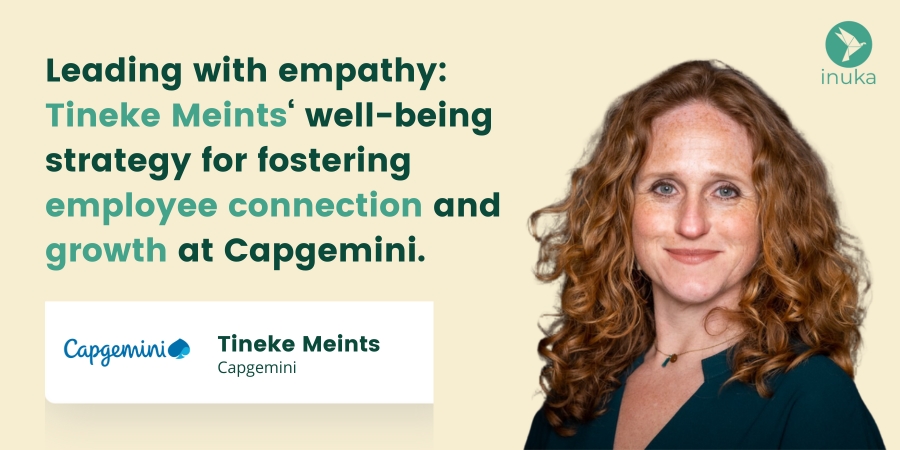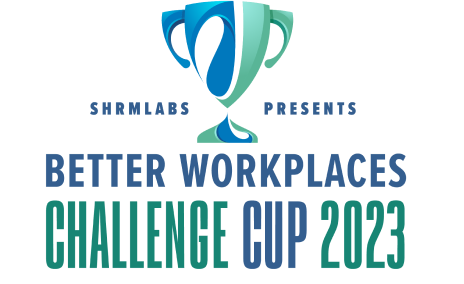Leading with empathy: Capgemini Tineke Meints’ well-being strategy

Tineke Meints, CHRO of Capgemini Netherlands advocates for a holistic well-being and vitality strategy at Capgemini, emphasizing empathy and connection to foster personal growth and employee engagement within the company's tech-focused environment.
Tineke, before we dive into the topic of well-being, could you introduce yourself, Capgemini, and your role as CHRO there?
Yes, I’m a married 45-year-old mother of three daughters. We live in Maarssen. I’ve been working as the CHRO at Capgemini Netherlands for three years now. Prior to this role, I spent almost my entire professional life at Randstad, a major HR service provider in the Netherlands. I began at the age of 21 as a recruitment consultant. Over the years, I had the opportunity to undertake diverse and fulfilling roles within the organisation, taking on progressively more senior roles and ultimately serving as the HR Director of Randstad Netherlands.
Over time, I realised I was particularly successful in empowering others. I realised this was the aspect of my work that I enjoyed the most. I’ve had various roles and worked with diverse teams, dealing with different services and models.
At one point, a few years ago, I started feeling restless and curious about a new environment, especially in an HR leading role. Then, this opportunity with Capgemini presented itself. I started the new job during lockdown. Although embarking during covid was quite challenging, I’ve been well guided and coached.

Why are you personally interested in well-being and employee well-being?
Well-being is a subject that personally resonates with me. Throughout my life’s journey and various roles, I’ve come to understand the profound significance of one’s approach to work and their outlook on life as a whole. It revolves around my well-being, encompassing how I feel, the harmony at home, my connection with family, and the alignment of my career. It hinges on feeling acknowledged, listened to, and accomplishing meaningful outcomes.
What adds to this fascination is how it aligns with theoretical frameworks and what other organisations are practicing. How can we enhance ourselves? How can the organisation be of greater value to its employees? In my view, the most pressing challenge when at the helm and accountable for a substantial organisation is the link to vitality, specifically the well-being of our employees.
Our employees are the cornerstone of our organisation. Despite being a technology-driven enterprise with a plethora of consultants steering technological advancements for our clients, our approach hinges on human involvement. This belief is deeply ingrained in Capgemini’s overarching philosophy. Also crucial is the ability of individuals to pursue their career aspirations within the organisation. In my perspective, these elements are intertwined at a fundamental level.

Which sources of inspiration have shaped your perspective on well-being?
Brené Brown’s work has been an inspiration for me. Even before assuming leadership roles, I delved into her books. Her TEDx talk left a lasting impression on me, where she shared her personal reflections and vulnerabilities, underpinned by a wealth of technical and scientific knowledge. It’s remarkable how everything she presents is factual and rational, yet woven into a fantastic, personal narrative. Her ability to amalgamate research, rationale, the business case, and the evidence supporting vulnerability, softness, and openness to change— the human aspect—I find truly inspiring.
I am also captivated by Tjitske Kramer due to her unique perspective stemming from her philanthropic standpoint. Kramer, a well-known figure in the Netherlands, offers a fresh outlook, analysing human behaviour and organisational patterns through a philosophical lens. I have gained substantial insights from her approach.

Could you shed some light on Capgemini's philosophy or approach to well-being, along with the strategic framework associated with it?
We are a vast organisation with a global workforce of 350,000 employees. Our global strategy is clear and transcends borders, encompassing our goals and the purpose driving our actions. This purpose is essentially unleashing human ‘energy through technology’, integrating human connections and energies into our approach. Through technology and innovation, we strive to improve systems and society globally. Our mission is to digitally enable the world, fostering inclusivity by providing access to essential technology. We emphasise creating reliable, ethical products and believe that innovation holds the key to making a positive impact, helping our customers transform and addressing critical issues like climate change.
We constantly adapt to stay relevant, updating our knowledge and skills. To achieve this, we cultivate an environment that nurtures safety, comfort, and curiosity. Our organisation attracts individuals who thrive on diverse projects and are fuelled by the passion for solving various challenges. We offer a plethora of opportunities for growth, allowing individuals to enhance their skills and take on exciting projects within their domain or explore new ones.
Central to all of this is fostering a culture of continuous self-improvement and curiosity, which we consider a prerequisite for addressing well-being. We have internal career coaches, professionals who are dedicated to helping our colleagues navigate their career paths, whether they’re dealing with challenges or seeking guidance for positive growth, ensuring they’re always moving forward.
An aspect I strongly emphasize is moving beyond mere discussion to concrete action. It’s about implementation, ensuring that we not only talk about our commitment but also demonstrate it through our actions. We ensure accessibility to coaches and cover the associated costs. It’s a seamless process for employees; they can readily avail this benefit without any concerns.
Additionally, we actively engage in diverse campaigns revolving around well-being and sports. It’s vital to keep evolving and experimenting to identify what strategies work best and effectively engage individuals in sports initiatives. Achieving this is paramount, especially in reaching out to the people that might still be on the fence.

What is your biggest frustration regarding employee vitality, and well-being?
Talking about your personal needs, especially when you are not doing so well, might be hard.
My greatest frustration lies in the misunderstanding and assumptions made between managers and employees, especially concerning the feeling of shame. For individuals who don’t experience this sense of shame, it’s easier to have open discussions when things aren’t going well. However, in cases where this shame is present, we tend to address the issue far too late. This results in not recognising and responding to the issue the employee faces.
The effect is that people might end up feeling downcast, frustrated, and ultimately either leave, fall ill, or make wrong choices, even though we could have prevented it in many cases. That frustrates me.

Do you also have KPIs or targets related to well-being, and if so, what are they?
We pay a lot of attention to employee engagement on the one hand and absenteeism percentages on the other, as they are important topics.
For employee engagement we have a real-time system in place where we monitor employees’ feedback. We call this ‘pulse,’ like a heartbeat, the pulse of our organisation. Other than that, we don’t have KPIs measuring well-being, stress or happiness levels.
I believe well-being, by definition, is a topic that should not be driven by KPIs. It’s about the conversations you have with employees. When we run a campaign or initiate something, we track how many employees engage and how they evaluate it. We always gather this feedback, but it’s not a KPI-driven process.

How is well-being organised in Capgemini?
Well-being is the responsibility of all managers. And it is taken care of by a dedicated team. This team oversees the entire landscape of well-being initiatives. This encompasses various preventive actions, and within the management team we closely monitor how these initiatives are progressing.
Our approach is holistic, and we believe that the individual’s manager plays a significant role. The manager is crucial in fostering well-being in its broadest sense. This approach is closely tracked and managed.

Can you elaborate on how it is integrated into the manager's role and how do you engage in conversations about well-being?
Managers receive a budget each year to do build the team. It could be about content or, more importantly, creating a sense of community and bonding among the team. This is not only during work but also after work, which I find even more important, as that connection was somewhat lost during Covid.
Through our pulse survey, we measure these well-being activities. Our entire company revolves around how many people we can attract and retain, how large our turnover is, and how successful we are in enabling all these people to make an impact at our clients. So, it’s deeply woven into our whole organisation.

And finally, can you give an example of a successful initiative, and unsuccessful initiative?
There are two things that have been very successful. We have many active employee networks that focus on various activities like sports, including e-games and board games, and more. It’s organised by and for the employees. We also organise various activities and clinics to improve in sports together. It’s a lot of fun to see colleagues supporting each other during marathons or other events, which creates a great bonding experience.
Another successful intervention was the implementation of a coaching program during the lockdowns. We noticed that especially young colleagues were struggling. The program had a significant impact and was successful because it was very low-key, anonymous, and easy to join.
We were able to help several individuals who were really struggling or feeling lonely. With our initiative, we were able to connect with them and provide support. The group for which it was intended made extensive use of this resource in just a few months.
What we find challenging, is the insufficient reach of our vitality campaigns. The challenge is to avoid that the same suspects actively participate and benefit from it. But there’s also a large group that could benefit from it and might consider to to participate, who we haven’t been able to reach effectively.
In essence, while we’ve seen great success in fostering community and providing support, our ongoing mission is to ensure that all our employees, especially those who need it most, can fully benefit from our vitality campaigns and feel truly connected within the company.

Did you like this interview?
Find more interviews with business leaders of various top companies via the button below. Would you like to receive the next interviews in your inbox? You can register below.
Powered by Inuka Coaching, a #BCorp and value-driven organisation. With our roots in research, we lead on evidence-based, digital and data-driven solutions that achieve measurable impact in employee vitality and resilience.
As part of our mission ‘Everyone resilient’, we strive to bring valuable content to advance the strategic thinking in employee well-being and facilitate a vibrant and growing peer network of leaders, because we all learn faster and achieve more together! Join our peer network of leaders focused on Well-being, register here
Find this post interesting? Share it with your connections!


